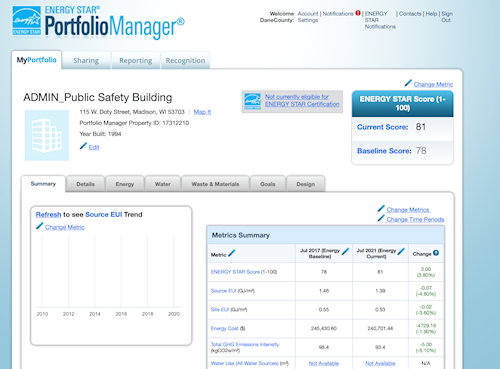

Mingxin Zhang
As a climate data assistant at the Office of Energy and Climate Change (OECC), my responsibilities are to make sure the utility data such as electricity, natural gas, and water are correctly and successfully uploaded to our energy tracking software (EnergyCAP). These tasks involve data collection from a variety of utility vendors, data processing in excel, and software deployment to keep track of the county statistics. I also have opportunities to explore different energy data management software to explore the best approach for Dane County to monitor utility data and collaborate with other local governments and business to achieve the decarbonization goal in the state of Wisconsin. Additionally, I also took advantage of the Federal EnergyStar Portfolio Manager program to benchmark the energy usage intensity (EUI) in the county buildings against the national average. These platforms generated vivid figures and reports to support the evidence of an increase in electricity generation by solar panels and to provide insights into the additional capacity of renewable energy in the county.
The EnergyCAP plays an important role in illustrating the utility data concisely and visually. For instance, EnergyCAP helps generate monthly and annually electricity and natural gas usage to depict the demand trend. It also provides the carbon emissions for the county according to the energy mix in local utilities. Moreover, being with local communities and attending community discussion also allowed me to understand the needs in underserved communities not just in utility, but also in water quality, recreational places, public transportation, and equity. As I learn more from the community efforts to mitigate climate change at local levels, I am more confident that the Climate Action Plan (CAP) will make a huge impact in the county.
I really appreciate that Kathy could give me an opportunity to work on these tasks and contribute to making the county better to reduce the carbon emissions and improve energy efficiency. The Climate Data Assistant position broadens my horizon from the utility providers’ perspective to reduce carbon emissions in the electricity sector. From the electricity generation mix to the electricity usage monitoring, I had a better understanding of how much electricity and natural gas a county could consume and greenhouse gas a county could emit. Furthermore, listening to other colleagues’ reports on the Climate Champion Program, covenants with solar panels, and the Sustain Dane Summit, I am amazed at how much the progress Dane County has made. I understand that implementing the CAP is a multifaceted process and involves various stakeholders. Keeping more stakeholders in the loop will help the county speed up the CAP progress and encourage the public to care more about carbon emissions.
Apart from the quantitative analysis, I found that most of the solar farms in Madison are owned by utilities. I brought up the question of why community solar projects do not exist in Wisconsin. Kathy’s answer triggered me to find out the differences among state policies regarding community solar projects. Due to Wisconsin’s legislation, third-party electricity providers are not allowed to sell their excess electricity, which is a barrier to expand the community solar projects. On the contrast, our neighbors Minnesota and Illinois have already enacted policies expanding the community solar market. Wisconsin State Senator Duey Stroebel and Representative Timothy Ramthun proposed community solar legislation in July 2021. Hopefully, it would enable the development of more community solar projects in Wisconsin. If I have more time during my position, I will compile more information about solar energy development history in Wisconsin and investigate the barriers of making community solar more accessible. I am also curious about the factors affecting their renewable energy investment and policy-making process such as public perception of renewable energy. Thus, I appreciate that my experience with the Office of Energy and Climate Change brings me a distinct perspective of policy analysis apart from the quantitative analysis perspective.

Mingxin is a second-year master candidate of Public Affairs at La Follette School of Public Affairs, UW-Madison. She has received the Energy Analysis and Policy Certificate from Nelson Institute of Environmental Studies. As our climate data assistant, she is enthusiastic about maintaining the EnergyCAP software, managing Dane County facility energy and water use data, and assisting with energy usage reports to implement the Climate Action Plan. Before joining Dane County, she finished the annual energy report project for the City of Fitchburg with other two teammates. She’s addicted to playing badminton, biking, and wandering in nature.
The Dane County Office of Energy & Climate Change maintains this blog as a way to offer:
To be sure that you don't miss new blog entries, subscribe to our email updates.